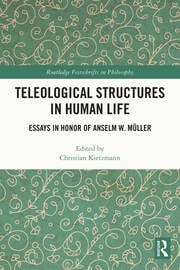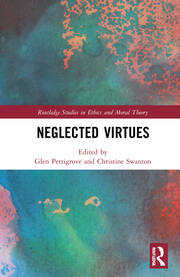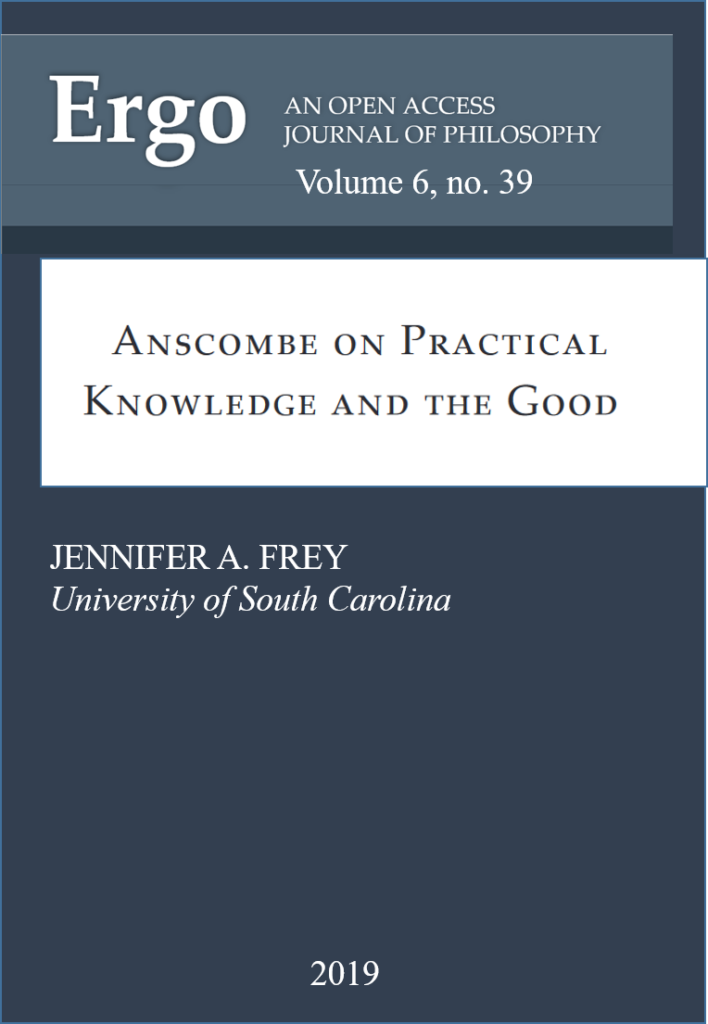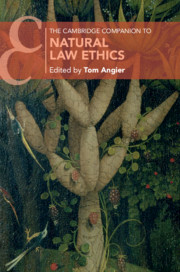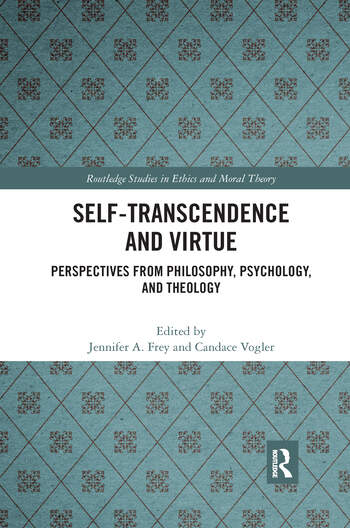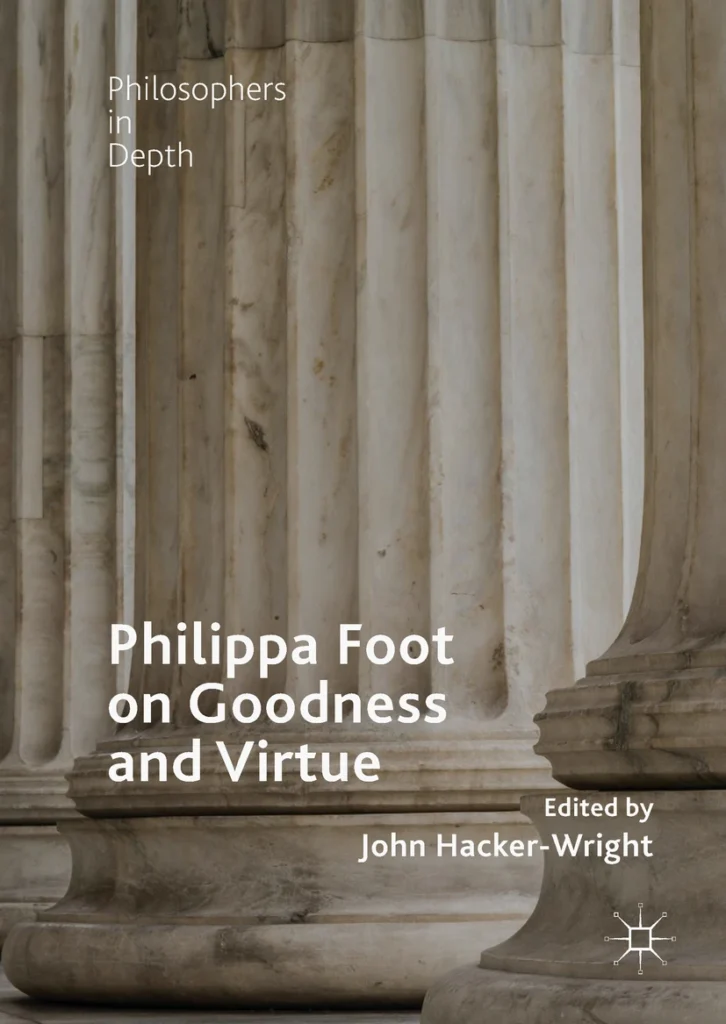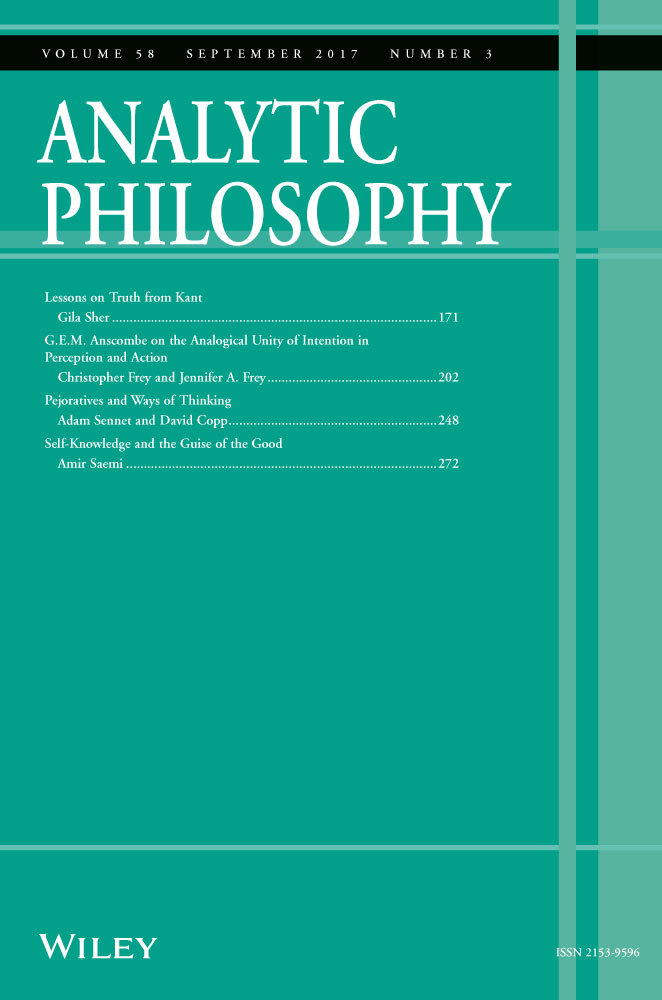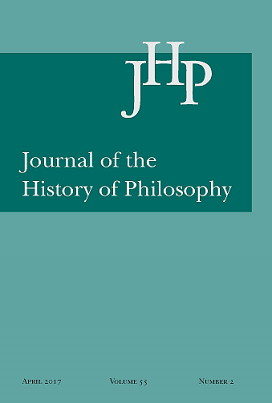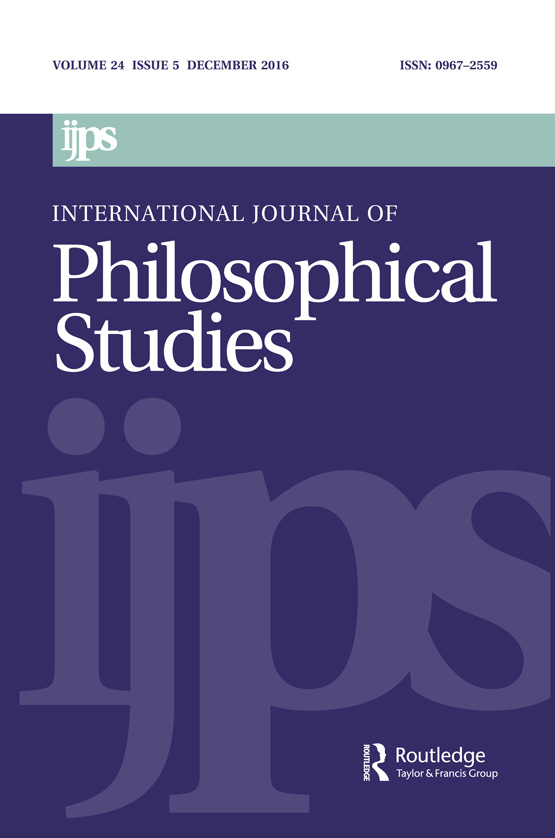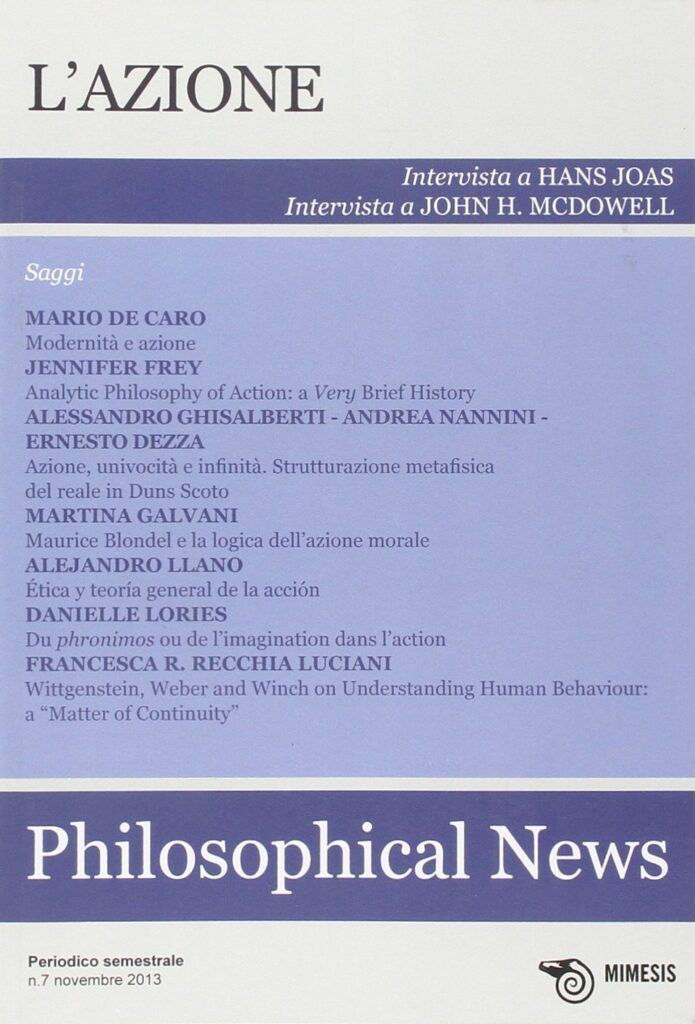Anscombe on the Voluntary Character of Negligence 1 in Teleological Structures in Human Life, Routledge, 2022.
Negligence is a neglected topic in work on Elizabeth Anscombe’s account of action. This is unfortunate because negligence is crucial to understanding Anscombe’s general philosophy of psychology—in particular, her account of the voluntary and the role that practical self-knowledge plays in her understanding of it. Attention to negligence also helps us better understand the extent to which Anscombe’s account of human agency and action is influenced by the thought of St. Thomas Aquinas. In this chapter, I discuss Anscombe’s account of practical self-knowledge of intentional action in order to show how the account can be extended to cover the voluntary. I then apply this account of the voluntary to her treatment of negligent actions and omissions.
“Temperance: Self-Control or Self-Possession?” in Neglected Virtues, Routledge, 2021, article 10.
In this paper, I return to Scholastic debates about “the subject” of virtue, in order to think about what sort of disposition temperance is. On the one hand, scholastic Augustinians argued that all virtues are good dispositions of the will, whereas scholastic Aristotelians argued that some virtues, like fortitude and temperance, are dispositions of our lower appetites. While Augustinians argued that we can resist, restrain, and control our sexual appetites, they did not believe those appetites could be well disposed in their own right. Temperance, for the Augustinians, is mere strength of will, resolve, or perseverance in the face of wayward, sensual desire. Aristotelians, by contrast, understood temperance not as mere self-control but as something more like self-possession, because they believed that the virtue of temperance habituates our experience of sensual desire so that it typically tracks the judgments of right reason. In the end, I argue that we should be Aristotelians rather than Augustinians about temperance.
“Revisiting Modern Moral Philosophy” in Values and Virtues for a Challenging World, Cambridge University Press, 2020.
This essay revisits Elizabeth Anscombe’s ‘Modern Moral Philosophy’ with two goals in mind. The first is to recover and reclaim its radical vision, by setting forth a unified account of its three guiding theses. On the interpretation advanced here, Anscombe’s three theses are not independently intelligible; their underlying unity is the perceived necessity of absolute prohibitions for any sound account of practical reason. The second goal is to show that Anscombe allows for a thoroughly unmodern sense of ‘moral’ that applies to human actions; the paper concludes with some reasons to think that this unmodern sense of ‘moral’ is worthy of further philosophical attention and defense.
“Anscombe on Practical Knowledge and the Good,” in Ergo: An Open Access Journal of Philosophy, Volume 6, No. 39, 2019–2020.
Two well known and widely discussed tenets of Elizabeth Anscombe’s classic monograph Intention are: first, that intentional actions are objects of a peculiarly practical form of cognition, and second, that intentional actions are pursued by agents sub specie boni, or under the guise of the good. Let us call these the knowledge requirement and the goodness requirement on action explanation. Although each thesis has its supporters and detractors, few have noticed that for Anscombe they are not independently intelligible—they stand or fall together. In this paper, I argue that practical knowledge is knowledge of the intended good, I explain how (and how not) to understand this thesis, and I tease out the implications of this thesis for Anscombe’s account of practical reason more generally, and how it would impact any possible account of practical wisdom.
“Happiness as the Constitute Principle of Action in Thomas Aquinas,” in Philosophical Explorations: An International Journal for the Philosophy of Mind and Action, Volume 22, Issue 2: Varieties of Constitutivism, Routledge, 2019, pp. 208-221.
Constitutivism is an ambitious meta-ethical thesis which aims to settle disputes about the nature, scope, and authority of practical reason; it claims that the requirements under which any particular action is judged good or bad are both internal to and constitutive of human action. A constitutive principle is one that simultaneously defines some thing and provides it with a measure of success or failure. In this paper, I explore the possibilities for a novel form of constitutivism, one that can be found in the writings of Thomas Aquinas. Aquinas understands human beings as agents that act for the sake of an end that both defines and measures their form of life: felicitas and beatitudo. For Aquinas, “happiness,” as the constitutive aim of human life, is what makes human acts properly human or “moral,” and also what sets them apart from animal movement generally. Unlike many contemporary constitutivists, however, Aquinas thinks this end is the natural and necessary goal of human action, and thus a natural and necessary end of the will. Thus Aquinas’s constitutivism is in keeping with his ethical naturalism, according to which practical reason and will are powers of a living being to realize its own form of life, according to its own self-knowledge of and desire for that very form.
“Neo-Aristotelian Ethical Naturalism,” in T. Angier, ed., The Cambridge Companion to Natural Law Ethics, Cambridge Companions to Philosophy, Cambridge University Press, 2019, pp. 92-110.
This paper discusses the principle claims of “neo-Aristotelian ethical naturalism,” which is an approach within analytic virtue that is distinguished by adherence to the following theses: (1) virtues are necessary for the attainment of specifically human happiness or flourishing; (2) a correct account of human flourishing needs to be grounded in some universal conception of human form; and (3) the virtuous person is the rule and measure of acting well, because she alone embodies the principles of right practical reasoning in her actions. The paper also discusses in what sense ethical naturalism should be understood as a development of the natural law tradition identified with the thought of Thomas Aquinas.
“Aquinas on Sin, Self-Love, and Self-Transcendence,” in Self-Transcendence and Virtue: Perspectives from Philosophy, Psychology, and Theology. Edited by Jennifer A. Frey and Candace Vogler, Routledge, 2018.
A longstanding complaint against Aristotelian ethics is that it is egoist. In this essay, I answer this old charge in a new way, by looking to vice and sin in the thought of Thomas Aquinas. The reason to turn to Aquinas is that he thought much more deeply about bad human action and its motivational structure and causes than Aristotle did, and his account makes it especially clear that egoism, understood as a theory of rational motivation that is grounded in one’s own private, self-interest, is incompatible with acquiring and exercising the virtues that are constitutive of human flourishing.
“How To Be An Ethical Naturalist,” in John Hacker Wright, ed., Philippa Foot on Goodness and Virtue, Palgrave-Macmillan, 2018, pp. 47-84.
The ethical naturalist asks us to take seriously the idea that practical norms are a species of natural norms, such that moral goodness is a kind of natural goodness. The ethical naturalist has not demonstrated, however, how it is possible for a power of reason to be governed by natural norms, because her own attempts to do this have led her into a dilemma. If she takes the first horn and stresses that ethical naturalism provides objective, natural norms of the species, then she fails to show how such norms are practical. If she takes the second horn and stresses that ethical naturalism yields a picture of knowledge of human life that is practical because it comes through virtuous dispositions of intellect and will, then she fails to have an account of how it is knowledge of facts about a life form, potentially accessible to a non-human knower. In this paper, I argue that one potential resolution to this dilemma can be found in the writings of Thomas Aquinas.
“Against Autonomy: Why Practical Reason Cannot Be Pure,” Manuscrito, 41 (4): 159-193, UNICAMP, 2018.
The perennial appeal of Kantian ethics surely lies in its conception of autonomy. Kantianism tells us that the good life is fundamentally about acting in accordance with an internal rather than an external authority: a good will is simply a will in agreement with its own rational, self-constituting law. In this paper, I argue against Kantian autonomy, on the grounds that it excessively narrows our concept of the good, it confuses the difference between practical and theoretical modes of knowing the good, and it cannot respect the essential, motivational efficacy of the principles of practical reason.
“GEM Anscombe on the Analogical Unity of Intention in Perception and Action” (co-authored with Christopher Frey), in Analytic Philosophy, Volume 58, Issue 3, 2017, pp. 202-247.
In this paper, we explore Elizabeth Anscombe’s idea that there is a fundamental unity to all our uses of the concept of intentionality. We discuss three salient features of intentionality to anchor our discussion. First, that intentional objects are given by expression that employ a “description under which”; second, that intentional descriptions are typically vague and indeterminate; and third, that intentional descriptions may be false. Exploring these features as they are discussed in Anscombe’s work on perception and action, we argue that intentionality is a grammatical concept which can only be understood by way of an investigation into the human praxis in which it is made manifest. When one competently makes a correct move within the linguistic or social practice in question, one demonstrates one’s grammatical understanding of intentionality. We conclude with a discussion of the form of unity of thought this understanding displays.
“Was Leibniz an Egoist?” in The Journal of the History of Philosophy, vol. 54 no. 4, 2016, p. 601-624.
Recent scholarship is nearly unanimous in attributing some form of egoism to Leibniz’s moral philosophy. In this paper, I argue that there are substantive reasons to reject this status quo. First, I argue that any non-trivial form of egoism must take all of an agent’s ends to be self-directed, and that this is incompatible with Leibniz’s theory of justice. Second, I argue that a rational psychology is non-trivially hedonist only if it understands pleasure as a separately identifiable aim of all actions, and that this is incompatible with Leibniz’s account of pleasure.
“The Capacious and Consistent Mind of Elizabeth Anscombe” in The International Journal of Philosophical Studies, Volume 24, Issue 2, 2016, pp. 252-262.
“Analytic Philosophy of Action – a Very Brief History” in Philosophical News, Mimesis Editions, 2013, pp. 50-58.
